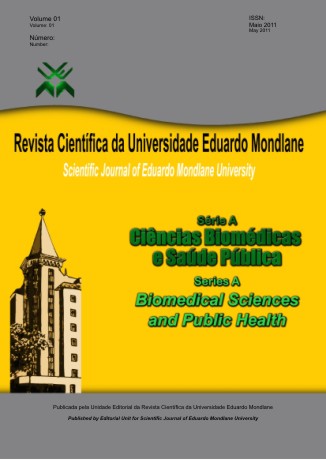COVID-19 E O MULTILINGUISMO EM MOÇAMBIQUE
Resumo
Em contextos de pandemia, a comunicação desempenha um papel fundamental, pois, ajuda a influenciar a mudança de comportamentos, a identificar e gerir atempadamente a desinformação e assegurar o direito à saúde através de informação necessária e de qualidade sobre a Covid-19: de que doença se trata, qual é o período de encubação, as medidas de prevenção e os sintomas da doença na língua que cada cidadão melhor fala. Neste artigo, analisamos a estratégia de comunicação adoptada no contexto da Covid-19, através do conteúdo de spot informativos sobre a doença nas línguas Nyungwe, Sena, Changana e Copi. Os spots informativos analisados no presente trabalho mostram que houve falta de divulgação de informação completa sobre a Covid-19 em línguas moçambicanas. Houve fragmentação da mensagem fornecida aos falantes de cada uma das línguas analisadas e noutros ainda, os falantes tiveram informação impertinente. Esta constatação leva-nos a concluir que, em contextos multilingues, a qualidade da informação sobre saúde não é assegurada exclusivamente com o uso das diferentes línguas moçambicanas mas sim, através do tratamento cuidado do conteúdo transmitido através delas. O MISAU tem a responsabilidade de assegurar que o direito à informação sobre doenças seja garantido aos cidadãos, liderando o processo de produção de spots.
Referências
ARAÚJO, A. et al. Práticas de tradução para aula de língua estrangeira. Florianópolis, v. 5, n. 9, p. 69-105, jul./dez. 2013.
BASTOS, Z. Estigma Social associado à: um guia para prevenir e combater o estigma social. 2020. Disponível em: https://washcluster.net/sites/default/files/2020-07/COVID19-Stigma-Guide-Portuguese.pdf (visitado a 01/07 de 2020).
BAMGBOSE, A. African languages today: the challenge of and prospects for empowerment under globalization. 1996. Disponível em: http://www.lingref.com/cpp/acal/40/paper2561 (visitado a 21/04/2020).
BARDIN, L. Análise de Conteúdo. 3ª Ed. Lisboa: Edições 70, 2011.
CÂMARA, R. Análise de Conteúdo: da teoria à prática em pesquisas sociais aplicadas às organizações. Gerais: Revista Interinstitucional de Psicologia, v.6, n.2, jul - dez, p. 179-191. 2013.
CHIMBUTANE, F. 2015. Línguas e Educação em Moçambique: uma perspectiva sócio-histórica. In: GONÇALVES, P. & CHIMBUTANE, F. (Org.). Multilinguismo e Multiculturalismo em Moçambique em direcção a uma coerência entre discurso e prática. Maputo: Alcance Editores, p.35-75.
CHIMBUTANE, F. 2015. Rethinking Bilingual Education in Postcolonial Contexts. Great Britain: Short Run Press Ltd.
Chomsky, N. Aspects of the theory of syntax. Cambridge, MA: MIT Press, 1965
FIRMINO, G. A Questão Linguística” na África Pós-Colonial: o caso do português e das línguas autóctones em Moçambique. Maputo: Promédia, 2002.
HAIMOVICH, G and MORA, H. Why it’s important to use Indigenous languages in health communication, in Language and Helth. 2020. Disponível em https://www.languageonthemove.com/why-its-important-to-use-indigenous-languages-in-health-communication/. Acesso a 01 de Julho de 2020).
MATEUS. H. e TIMBANE, A. Cuidando de Saúde em Gitonga e Português – Rumo a um Dicionário de Especialidade. Afluente: Revista de Letras e Linguística, Maranhão, v.4, n.12, Maio/Agosto p. 144-167, 2019.
HYMES, D. Acerca de la Competencia Comunicativa. In Llobera, M. et al. Competencia comunicativa: Documentos básicos en la enseñanza de lenguas extranjeras. Madrid: Edelsa, 1972.
LOPES, A. J. Política Linguística: princípios e problemas. Maputo: Livraria Universitária, 1997.
MENDES, A. 2006. Escuta e ressignificação do sofrimento: o uso de entrevista e análise categorial nas pesquisas em clínica do trabalho. In: Sociedade Brasileira de Psicologia Organizacional e do Trabalho (Org.), Anais Eletrônicos do II Congresso de Psicologia Organizacional e do Trabalho. Brasília. Disponível em http://www.sbpot.org.br/iicbpot/anais.asp. Acesso em 06 de Maio de 2006.
MIRAMAR, 2020. Fala Moçambique. Gravado em 18 de Abril de 2020.
MOÇAMBIQUE.MISAU. 2020a. Plano Nacional de Preparação e resposta a pandemia da COVID-19. Disponível em: http://www.misau.gov.mz.
........................ Comunicado Diário de Atualização de casos de coronavírus. 2020b. Disponível em http://www.misau.gov.mz. Acesso em 15 de Agosto de 2020.
......................... O que é Coronavírus? 2020. Disponível em http://www.misau.gov.mz/index.php/o-que-e-coronavirus. Acesso em 15 de agosto de 2020).
MOÇAMBIQUE. Constituição da República. Maputo: Assembleia da República, 2004.
MORAES, R. Análise de conteúdo. Revista Educação, Porto Alegre, v. 22, n. 37, p. 7-32, 1999.
NGUNGA, A. e BAVO, N. Práticas Linguísticas em Moçambique: avaliação da vitalidade linguística de seis distritos. Maputo: Centro de Estudos Africanos (CEA), 2011.
OLABUENAGA, J e ISPIZUA, M. La descodificacion de la vida cotidiana: metodos de investigacion cualitativa. Bilbao, Universidad de Deusto, 1989.
ONU. Declaração Universal dos Direitos Humanos. Assembleia Geral das Nações Unidas. Nova Iorque. 1948. Disponível em: https://nacoesunidas.org/wp-content/uploads/2018/10/DUDH.pdf. Acesso em 01 de julho de 2020).
PADILHA, E. Reflexões sobre a competência comunicativa e a formação de professores em língua estrangeira e suas competências. Linguagens & Cidadania, v. 15, jan./dez. 2013.
PILLER, I. forces us to take linguistic diversity seriously. 2020. Disponível em https://www.languageonthemove.com/-forces-us-to-take-linguistic-diversity-seriously/. Acesso em 01 de julho de 2020.
PYM, A. 2015. Translation as risk management. Journal of Pragmatics, v.85, pp 67-80.
PYM, A. 2010. Translation theory today and tomorrow: responses to equivalence. In: Lew N. Zybatow (ed.). Translationswissenschaft- Stand und Perspektiven. Frankfurt aM: Peter Lang, p. 1-14.
SANTOS, R. Tradução cultural: o desafio da expressão idiomática. Dissertação (Mestrado) – Tradução e Serviços Linguísticos, Universidade do Porto, 2016.
UNESCO. Declaração Universal dos Direitos Linguísticos. 1996. Disponível em http://www.dhnet.org.br/direitos/deconu/a_pdf/dec_universal_direitos_linguisticos.pdf. Acesso em 01de julho de 2020).
WHYTE, S. Revisiting Communicative Competence in the Teaching and Assessment of Language for Specific Purposes. Language Education & Assessment, v.2, n.1, pp 1-19. 2019.
SITES
https://reliefweb.int/report/world/do-you-speak--importance-language-effective-communication-across-response-march Acesso em 01 de julho de 2020. https://translatorswithoutborders.org/language-diversity-in-the--pandemic/. Acesso em 01 de julho de 2020).
https://www.abrasco.org.br/site/noticias/comunicacao-popular-e-comunitaria-em-tempos-de--o-direito-de-se-comunicar-e-o-direito-a-saude/47000/. Acesso em 01 de julho 2020.


